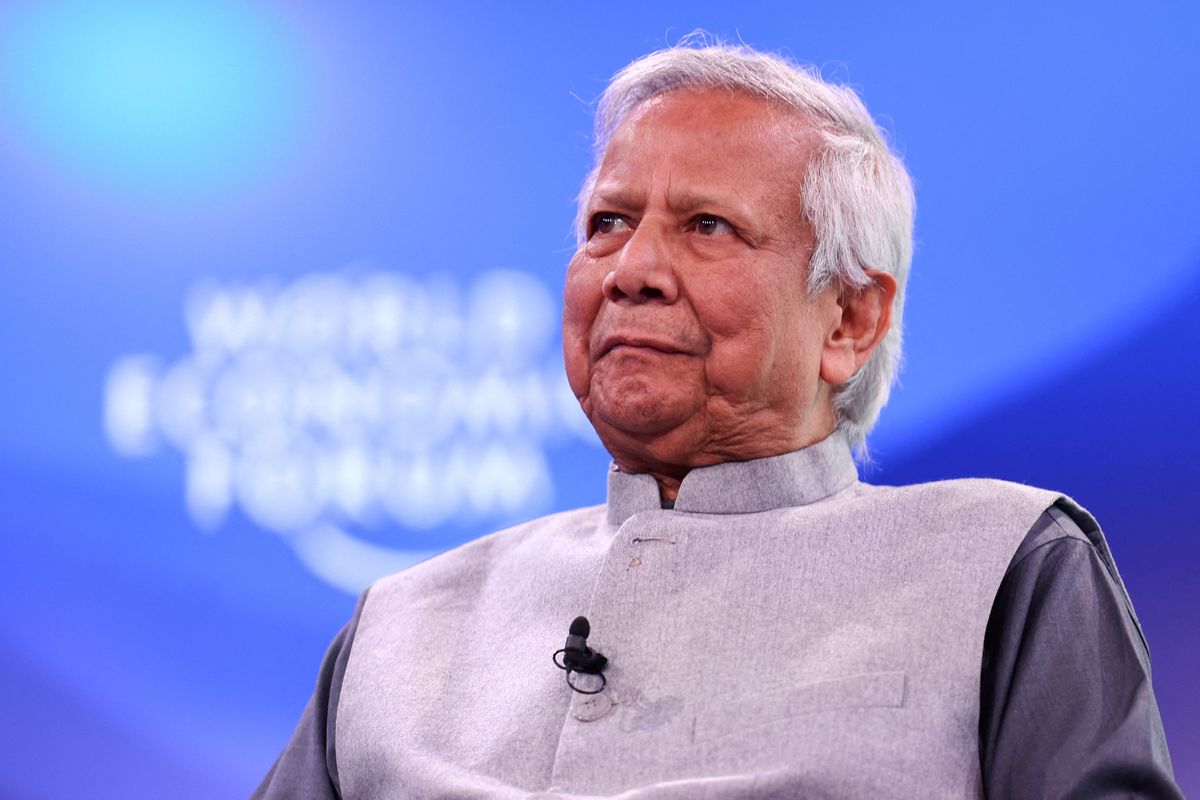Bangladesh consensus commission fails to find agreement
Marathon talks stretched over 45 sessions involving 38 political parties and 166 recommendations

FILE PHOTO: Muhammad Yunus, interim head of the Bangladesh government, attends the 55th annual World Economic Forum (WEF) meeting in Davos, Switzerland, January 23, 2025.
Reuters
Disputes over PM term limits, president post, and 'secularism' vs 'pluralism'
Nobel laureate Yunus leads caretaker government after Hasina's ouster
Second round of talks planned with public survey of 46,000 families
Bangladesh's National Consensus Commission, tasked by the caretaker government to lead critical democratic reforms after a mass uprising last year, said Monday that political parties had failed to reach agreement.
The South Asian nation of around 170 million people has been in political turmoil since former prime minister Sheikh Hasina was ousted by a student-led revolt in August 2024, ending her iron-fisted rule of 15 years.
Muhammad Yunus, the 84-year-old Nobel Peace Prize winner who is leading the caretaker government as its chief adviser until elections are held, has previously said he inherited a "completely broken down" system of public administration.
Yunus has said it required a comprehensive overhaul to prevent a future return to authoritarian rule. He set up six commissions to do that work, overseen by the Consensus Commission, which he heads.
Ali Riaz, the commission's vice president, said that despite marathon efforts they had not reached a deal.
"It wasn't possible to reach a consensus on several significant constitutional issues," Riaz told reporters in Dhaka, saying talks stretched over 45 sessions.
"We have been discussing 166 recommendations with 38 political parties and alliances."
Riaz, a political science professor at Illinois State University, said the teams would not give up.
Constitutional disputes block agreement
"We are going to begin a second round of talks," he said, adding that the country's statistics bureau would "conduct a household survey to gauge public opinion". The commission plans to include 46,000 families in the survey.
Contentious issues include whether a prime minister can serve more than two terms, and the process for selecting the president.
The procedure for appointing the chief of the interim government, and the duration of its tenure, has also divided parties, Riaz said.
Parties also debated recommendations to change the terms of the constitution from "secularism" to "pluralism".
Bangladesh is a Muslim-majority nation, with Hindus accounting for less than a tenth of the population.
"Although most parties rejected the idea of pluralism, they recommended incorporating some form of protection for minorities," he said.
Yunus warned on Saturday that political power struggles risked jeopardizing gains that have been made, carrying out two days of talks with more than 20 political party leaders.
Hasina's rule saw widespread human rights abuses, including the mass detention and extrajudicial killings of her political opponents.
Her government was also accused of politicizing courts and the civil service, as well as staging lopsided elections to dismantle democratic checks on its power.
Election timeline remains uncertain
Yunus has said polls could be held as early as December but that holding them later -- with the deadline of June 2026 -- would give the government more time for reform.
On Saturday, Yunus met with the key Bangladesh Nationalist Party (BNP), seen as the election front-runners, who are pushing hard for polls to be held by December.
The military insisted at a press conference on Monday that there was no division with Yunus.
It was the first address to the media since army chief General Waker-Uz-Zaman gave an address to officers on May 21.
He said that elections should be held by December, aligning with BNP demands, according to Bangladeshi media and military sources.
"There is no rift between the government and the Bangladesh Army," Lieutenant Colonel Muhammad Shafiqul Islam told reporters.
"We share a cordial relationship and are working together for the sake of the country."






Comments
See what people are discussing